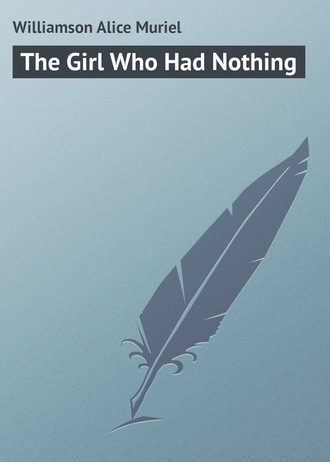
The Girl Who Had Nothing
"This has hurt and shocked you, too," he said. "There is one thing I must say to you, and it is this: it is only for her father that I care. I want her to be happy in her own way. We did not suit each other."
"I used sometimes to think not," Joan answered in a voice genuinely broken. "I used to be afraid that-if you should ever marry-you would not have been happy. Perhaps she-wasn't the right one for you."
Her eyes were downcast, but the compelling power of love in the man's caught them up to his and held them.
"I have known that she wasn't the right one for a long time," he said. "I have known the right one, and it is you. I love you with all my heart. I want you. You are the one woman on earth for me. I hadn't meant to say this now, but-I can't let you go out of my life. I must do all I can to keep you always."
"Don't!" gasped Joan. "Don't! it will kill me. Oh, if you only knew, how you would hate me!"
"Nothing could make me hate you."
"Yes. Wait!" And then Joan poured out the whole story-not only of this last fraud, but of all the frauds; the story of her "career."
He listened to the end, without interrupting her once. Then, at last, when the strange tale was finished, and the pale girl was silent from sheer exhaustion of the hopeless spirit tasting its punishment in purgatory, he held out his arms.
"Poor, little, lonely girl!" he said. "How sorry I am for you! How I want to comfort and take care of you all the rest of your life, so that it may be clear and white, as your true self would have it be! And-how glad I am that you're not a widowed Comtesse!"
—She was in his arms still when a knock at the door roused them both from the first dream of real happiness the girl had ever known.
A servant brought a card. She took it from the tray and read it out mechanically: "Mr. George Gallon."
"Tell the gentleman-" she had begun; but before she could go further with her instructions George Gallon himself had entered the room.
"Well, Miss Carthew," he said, "I heard from an unexpected source that you were here, swaggering about as the widow of a French Comte. I needed a little holiday, and so I ran out to see whether you were a greater success as a Comtesse than you were as a typewriter in my office. Oh! I beg your pardon. You're not alone. I'm afraid I may have surprised your friend with some disagreeable news."
"Not at all," said Justin Wentworth calmly. "Miss Carthew has not only told me of that episode in her life, but how it became necessary for her to take up the position of a typewriter. Your treatment of her seemed almost incredible-until I saw you. No wonder it was necessary for Miss Carthew to adopt an alias, if this is the sort of persecution she is subject to under her own name. But in future it will be different. As Lady Wentworth she will be safe even from cads like you; and though she is not yet my wife, I'm thankful to say I have even now the right to protect her. When do you intend to leave Biarritz, Mr. Gallon?"
George opened his lips furiously, but snapped them shut again. Then, having paused to reflect, he said: "I am here only for an hour. I'm going on to Spain."
"Pray watch over your tongue in that hour," returned Wentworth.
Then George Gallon was gone.
"I'll worship you all my life on my knees," said Joan. "I'm not worthy to touch your hand. But I will be. I will be a new self."
"Only the best of the old one, that is all I want," answered her lover. "The past is like a garment which you wore for protection against the storm. But there will be no more storms after this."
"Because you have forgiven me, because you believe in me," cried Joan, "you will make of me the woman you would have me!"
"The woman you really are, or I would not have loved you," he said.
And so it was that Joan Carthew's career ended and her life began.


